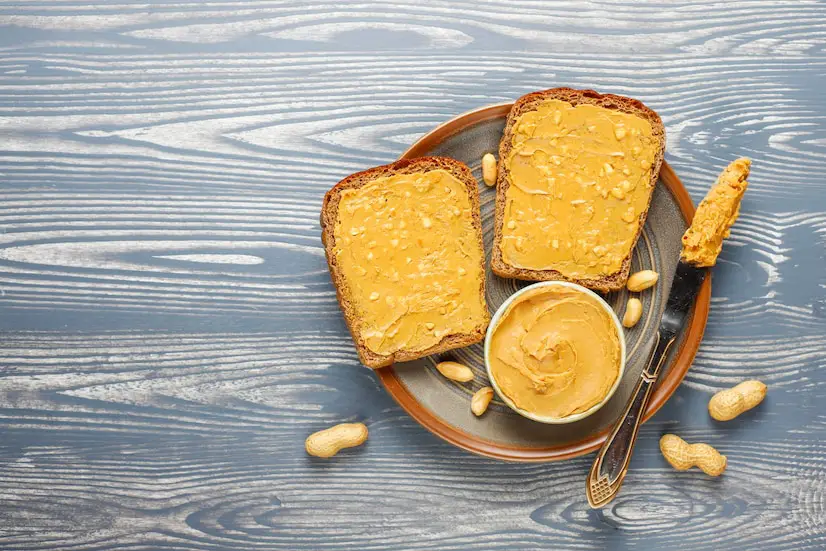Of all the different kinds of nuts known to lower cholesterol, peanuts have always been the most preferred. Peanut butter is one of the most relished food items and is known for its extensive list of nutritional benefits. However, for a very long time, there have been speculations that peanut butter increases the chances of acid reflux.
Acid reflux is a condition in which the acid present in the stomach flows in a reverse direction and enters the esophagus leading to symptoms like a burning sensation in the chest, otherwise known as chest burn, and a sour taste in the mouth. Food items play a vital role in influencing the symptoms of acid reflux.
The pH of peanut butter lies in the near-neutral range, near 6.87. Although peanut butter should not affect acid reflux from a pH point of view, some other parameters affect the symptoms of acid reflux. Rich in fats and proteins, peanut butter stays in the digestive system for a very long period. Therefore, the body takes more time to break down the proteins and fats.
Moreover, some studies have shown that eating food items rich in fats and proteins can increase the chances of reflux. Not only that, peanut butter stimulates the generation of gastric acid due to the high levels of oleic acid present in it. But none of the above factors indicate any adverse effects of eating peanut butter. However, peanut butter can also cause severe allergic reactions like anaphylaxis in those allergic to it. Hence, peanut butter should be avoided by people who are allergic to peanuts. They can choose alternative food items to fulfill their nutritional requirements.
The effect of food on reflux symptoms has been studied extensively. However, the impact of specific food items on reflux is not known. A commonly used food item, peanut butter is one such food product. The University of Pittsburgh Medical Center has listed peanut butter as a good option for people who suffer from acid reflux. Additionally, Cedars-Sinai Medical Center has reported that smooth peanut butter can decrease the incidence of acid reflux.
Should peanut butter be avoided in those who suffer from gastrointestinal reflux disease (GERD)?
People who suffer from GERD can take peanut butter as long as they are not allergic to it. Moreover, if one experiences reflux symptoms after taking peanut butter, it is advisable to avoid it.
Research has shown that symptoms of acid reflux seen in certain food items can be due to the interaction between allergic substances and the esophagus. The study, “Practical approach to implementing dietary therapy in adults with eosinophilic esophagitis: the Chicago experience,” points out the potential connection between eosinophilic esophagitis and food allergens. Therefore, it stresses eliminating certain food items from the diet, like milk, wheat, egg, soy, fish, and nuts.
What should be done to treat acid reflux?
If the symptoms of acid reflux are infrequent, intervention is not required. Antacids can help you get relief from mild abdominal discomfort. However, they should not be taken for more than two weeks. Persistent symptoms can be treated with medicines like proton pump inhibitors and H2 receptor antagonists. In addition, lifestyle changes can reduce the frequency and severity of reflux symptoms.
Why is peanut butter a preferred choice of food?
There are several reasons to justify the inclusion of peanut butter in one’s diet. A few of them are:
- Peanut butter is a rich source of niacin. Niacin plays a crucial role in lowering cholesterol levels and protecting the heart from stroke and other diseases.
- Being a rich source of vitamin E, peanut butter helps to boost the immune system.
- Antioxidants like polyphenols are found abundantly in peanut butter. They help delay the aging process.
- Being a good source of fiber, it can improve digestive health.
- Peanut butter increases satiety, thus making it one of the most preferred food items for weight control efforts.
- Minerals like magnesium and potassium and vitamins like vitamin B6 can reduce blood pressure and promote bone health.
- The fats present in peanut butter help lower the levels of bad cholesterol.
Conclusion
Peanut butter is thus slightly acidic in nature. However, peanut butter made from raw peanuts is more acidic in nature compared to peanut butter made from roasted peanuts. The pH is below the neutral value of 7, making peanut butter acidic in nature.
No research clearly states the relationship of peanut butter with symptoms of acid reflux. There are mixed opinions on the effect of peanut butter on acid reflux symptoms. Hence, it is advisable to keep in mind a few points before adding peanut butter to the diet:
- Peanut butter should be added to the diet in small amounts initially. It can be increased subsequently.
- Peanut butter should not be used with food items that trigger reflux, such as fried food and chips or other processed snacks and fast food.
- Despite being a pH-neutral substance, peanut butter can affect gastric acid secretion and cause GERD. In addition, it can cause reactions from mild to potentially fatal conditions like anaphylaxis in people who are allergic to it.
References
Digestive Disorders. (2016, January 5). Diet for GERD: Foods for heartburn. UPMC HealthBeat; UPMC. https://share.upmc.com/2016/01/gerd-symptoms-treatment/
Doerfler, B., Bryce, P., Hirano, I., & Gonsalves, N. (2015). A practical approach to implementing dietary therapy in adults with eosinophilic esophagitis: the Chicago experience: Dietary therapy in adult EoE. Diseases of the Esophagus, 28(1), 42–58. https://doi.org/10.1111/dote.12175
Eating on a soft food diet plan. (n.d.). Cedars-Sinai. Retrieved 26 May 2022, from https://www.cedars-sinai.org/blog/esophageal-soft-diet-guidelines.html
Madell, R. (2021, August 23). GERD diet: Foods to eat and avoid for acid reflux. Healthline. https://www.healthline.com/health/gerd/diet-nutrition
Newberry, C., & Lynch, K. (2019). The role of diet in the development and management of gastroesophageal reflux disease: why we feel the burn. Journal of Thoracic Disease, 11(Suppl 12), S1594–S1601. https://doi.org/10.21037/jtd.2019.06.42


